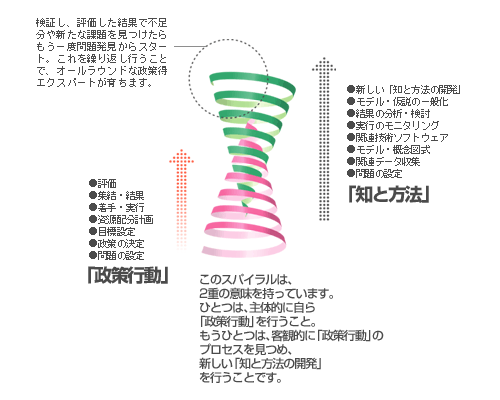Creating a policy spiral
In today's global socio-cultural upheaval, a more comprehensive and pluralistic approach that goes beyond the perspective of individual sciences is required to clarify this phenomenon. In addition, innovative and living academic fields that take into account the proposal, implementation, and evaluation of problem-solving in response to new situations are required. Recently, some universities have been established that provide interdisciplinary education with the aim of interrelating multiple individual sciences or exchanging them across borders. However, these interdisciplinary attempts are still strongly bound by the ideas and methods of the traditional individual sciences, and the problem of disciplinary stagnation has not yet been resolved. As a result, the results obtained are limited in scope, and there seem to be few signs of groundbreaking intellectual creation. In order to go beyond the limitations of traditional sciences, open up new creative horizons of knowledge, and promote the sophistication of policy research for problem solving, we must respond to the following challenges.
Comprehensive understanding
Reorganization of knowledge
If we continue to rely on traditional individual sciences, we will not be able to effectively respond to the complex and multifaceted problems of the target world. Therefore, we need to go beyond the existing individual science systems and reconstruct knowledge to comprehensively grasp the target world. This is called the Recodification of Episteme. In order to find a way forward with the problems raised by the complex target world, it is essential to discover problems that are not bound by traditional individual sciences and to reconstruct knowledge. To do this, we need to grasp the target world in a comprehensive and multifaceted way. Now that the limitations of subdivided academic disciplines are clear, we must reconstruct knowledge appropriately based on the demands of the target world.
Emphasis on practical learning
Establishment of problem-solving and practical education
The existing individual sciences have been tasked solely with the objective analysis of their subjects. Problem analysis is a step toward problem solving, but it is not problem solving itself. It is important to academically integrate the series of intellectual processes from problem discovery, analysis, and solution. If we consider the science that actually encompasses problem solving to be "practical science," what is required in the new era is to establish a progressive cycle of problem solving, evaluating the results, and moving toward new problem discovery, that is, the dynamism of the Spiral Evolution of Practice. The urgent task of the new era is to form and educate the Spiral of Practice through the reorganization of knowledge that transcends the individual sciences. In other words, it is necessary to shift from contemplative and analytical knowledge to participatory and practical knowledge.
The "practical learning" advocated by our founder, Ryukichi Endo, is nothing less than learning that is useful to the world and that asks questions of it. We must further develop the philosophy of "vital learning" that Ryukichi Endo advocated, and create a living point of contact between learning and the world in which it is based.
Promoting advanced policy research
The unfolding of a policy spiral
"Policy" is not limited to the policies of governments or administrative organizations, but is rather a generalized concept that covers a wide range of human behavior. When humans feel dissatisfied with their environment or discover a problem, they will act on the external environment in search of a better relationship, or take action to change themselves. This is unique to humans. Language and data mediate between these two, and information is the accumulation of these. The act of formulating a plan based on this information and executing it is what we call a policy.
The concept of "policy" has a wide scope of application, covering everything from individuals to groups, organizations, governments, and international organizations in terms of subjects, and from private and individual issues to public or international issues in terms of problem areas. In education and research at the Graduate Graduate School of Policy Studies, Doctoral Program, the iterative process of problem discovery, problem definition, policy planning, implementation, evaluation, and then problem redefinition is called the "policy spiral," and is at the core of the reorganization of knowledge.
Formation of a policy research hub
Contribution of policy research to society
Up until now, Japan has lacked the intellectual accumulation that would allow for a breakthrough in this type of practical policy research.Also, it cannot be said that there has been sufficient education and research that is effective in the real world, and it is undeniable that academic research in this field has become detached from real-world trends.
In response to real policy issues, our graduate school focuses on actual policy practice known as the "policy spiral," and our mission is to train experts who have acquired the results of advanced academic research in this field. We aim to accumulate human resources and resources for policy research, establish a research system that will dramatically improve the level of research, and form a base for education and research on policy. Our goal is to be exposed to the latest policy information from around the world, disseminate this information, and contribute to society.
